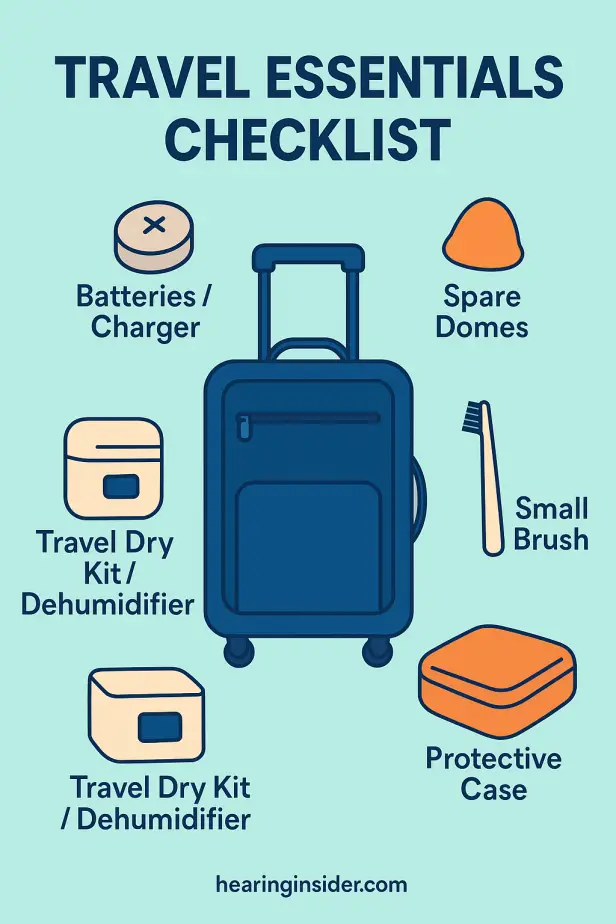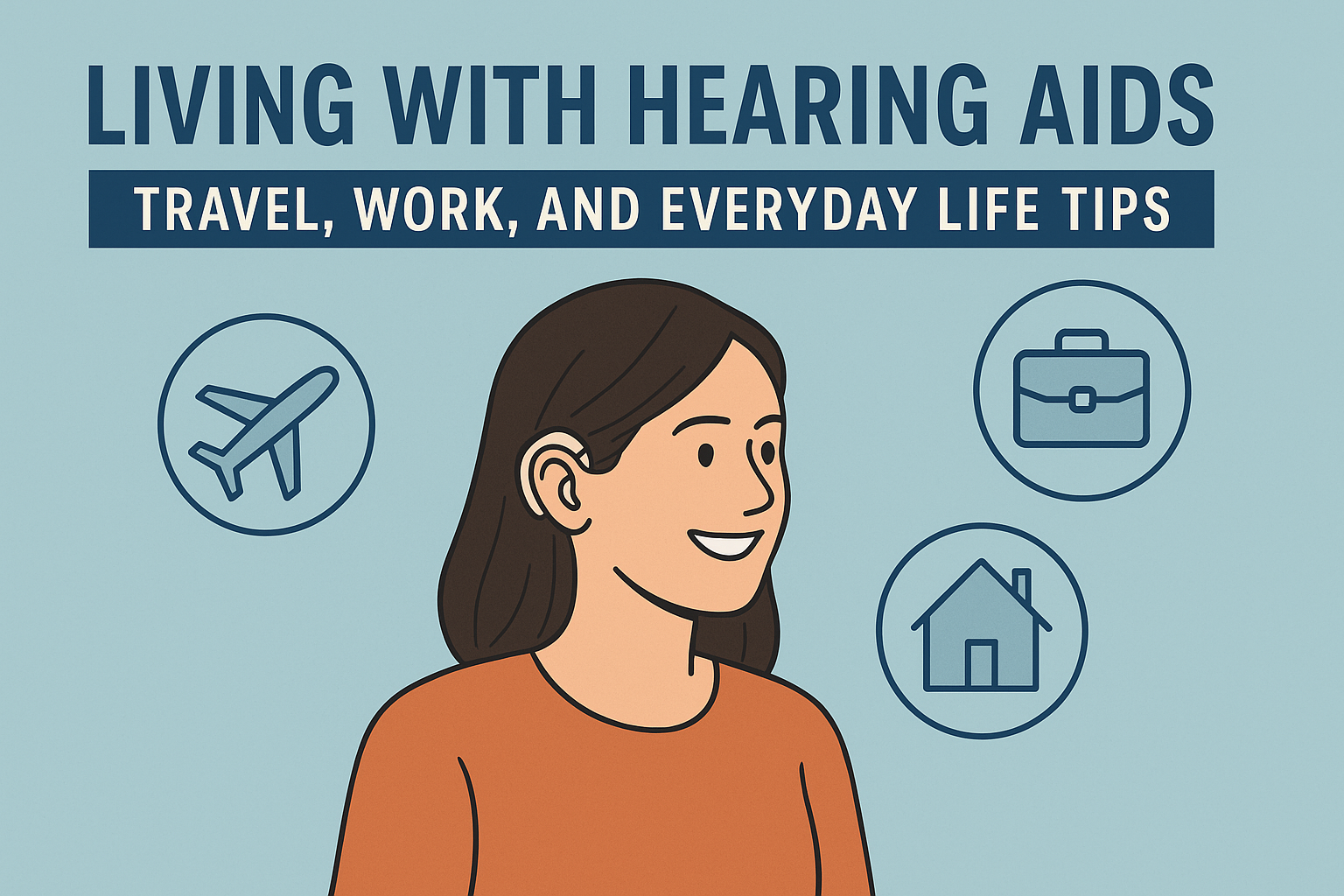Hearing aids aren’t just clinical devices — they’re part of your everyday life. From the workplace to vacations, from medical appointments to concerts, they need to keep up with you. Since most people wear hearing aids 12–16 hours per day, knowing how to handle different environments is essential. This pillar brings together expert tips on travel, work, recreation, and performance, with links to deeper guides on Hearing Insider.
Summary: Start with the checklists and table below, then dive into the linked guides for situation-specific advice (air travel, beaches, cruises, theme parks, work accommodations, sports, and music).
On this page
- Work & Health Settings
- Traveling with Hearing Aids
- Hobbies, Sports & Outdoors
- Music, Singing & Performance
- Environment Comparison Table
- FAQs
- Authoritative Resources
- Related Articles
Hearing Aids at Work & in Health Settings
In professional settings, the right strategies and tools keep you confident and productive. If you’re navigating meetings or noisy spaces, start with using hearing aids on the job and learn how to optimize microphones, streaming, and captioning. When you need formal support, adapt our workplace accommodation letter template to request adjustments under disability policies. Also, don’t leave money on the table — you may be eligible to use HSA/FSA funds for hearing aids.
Medical procedures: Some imaging (e.g., MRI) or surgical environments may require removing devices. Review safety tips for medical procedures and inform your care team in advance. For long-term care planning, see nursing homes and hearing aids.
Note: Policies and accommodations vary by employer and jurisdiction. See the U.S. Department of Labor’s guidance on workplace accommodations and bring questions to HR.
Traveling with Hearing Aids

Whether you’re flying, cruising, or planning a theme-park marathon, a bit of prep prevents most issues. For a broad overview, start with vacationing with hearing aids, then jump into the specific guides below.
Travel Essentials Checklist
- Carry-on kit: batteries/charger, spare domes, wax guards, small brush, protective case.
- Moisture control: travel dry kit/dehumidifier; keep devices out of direct water and sauna/steam.
- Backup plan: basic phone/alerting strategy and printed clinic info in case you need help on the road.
Airports & Airplanes
Good news: you can wear hearing aids through security and in flight. Learn practical tips in using hearing aids on airplane flights. If you prefer to avoid being wanded around the head, notify an officer — see TSA’s guidance for travelers with medical devices here.
Cruises & Theme Parks
Humidity and long days can wear down devices. For ships, read going on a cruise with hearing aids. For parks, plan battery life, streaming, and show-time strategies with Disney World tips for hearing aid users.
Beaches & Resorts
Salt, sand, and sunscreen are tough on electronics. Use hats, cases, and water-avoidance strategies from beach trips with hearing aids, and dry the devices nightly.
Hobbies, Sports & Outdoor Life
Active days are doable with hearing aids — just manage sweat, fit, and impact.
For hunters, balance protection and awareness with wearing hearing aids while hunting. Riders can reduce wind noise and improve helmet fit using tips in hearing aids and motorcycles. If workouts are your thing, consider designs highlighted in the best hearing aids for athletes and understand the effects of exercise on tinnitus and hearing.
Reality check on “waterproof”: Many modern aids carry an IP68 rating, but that doesn’t equal pool-proof. Avoid submersion; clean and dry after sweat or rain.
Music, Singing & Performance
Music stresses different parts of a hearing aid’s processing than speech. Ask your audiologist for a dedicated music program with less noise reduction and wider input limits. Explore how hearing loss impacts vocal control in how hearing loss affects singing, and review device picks in the best hearing aids for musicians.
Environment Comparison Table
| Environment | Common Risks | Key Precautions | Related Guide |
|---|---|---|---|
| Airplane | Cabin noise, pressure | Keep aids in; stream audio; pack carry-on kit | Flying with Hearing Aids |
| Beach | Saltwater, sand, sunscreen | Avoid water; use hats/cases; nightly dry kit | Beach Trips with Hearing Aids |
| Workplace | Meetings, background noise | Captioning; mic placement; request accommodations | Workplace Guide |
| Medical | Imaging, anesthesia | Remove when instructed; tell providers ahead | Procedure Safety |
| Sports | Sweat, impact, wind | Sweatbands/sleeves; secure fit; dry after | Athlete Picks |
| Cruise / Theme Park | Humidity, long wear time | Battery plan; streaming strategy; nightly drying | Cruise Tips · Disney Tips |
Frequently Asked Questions
Can I wear hearing aids through airport security?
Yes. Scanners and metal detectors are safe, and most travelers keep their devices in. If you’d rather avoid a head wand, tell the officer. See TSA guidance.
Are hearing aids waterproof for the beach or pool?
No — most are water-resistant only. Keep them dry, avoid submersion, and use a dry kit overnight. For beach-specific tips, read our beach guide.
Do airlines require passengers to remove hearing aids?
No. Devices can stay in for all phases of flight. For entertainment, consider streaming or noise-reducing headphones over the aids if comfortable.
Can sweat damage hearing aids during workouts?
Yes. Use sleeves or sweatbands, wipe them down, and dry nightly. See the athlete guide.
What if I rely on my hearing aids during a medical procedure?
Talk to your care team early. Some procedures allow one device in the non-operative ear; others require removal. Read procedure safety tips.
Authoritative Resources
- TSA: Traveling with Disabilities & Medical Conditions
- U.S. Dept of Labor: Workplace Accommodations
- NIDCD: Hearing & Balance Health Topics
Related Articles on Hearing Insider
- Best Waterproof Hearing Aids
- 6 Reasons Why Your Hearing Aid Is Cutting Out (replaces older “cut in and out” link)
- Wear Your Hearing Aids All Day (replaces older “when to wear” link)
- First Day with Hearing Aids — and No Difference: Is That Normal?

